Black Hawk down: the untold story of three survivors
What happened when a NATO Black Hawk helicopter crashed in Afghanistan in 2010, killing three Australians and one American?
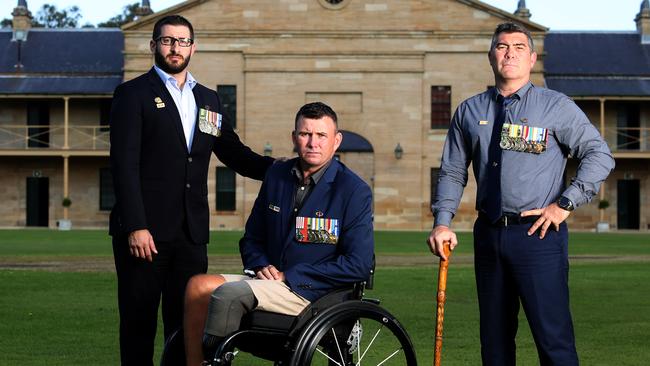
A NATO Black Hawk helicopter crashed in Afghanistan in the early hours of June 21, 2010, killing three Australian commandos and one US soldier.
Eleven men were wounded.
That is about all anyone knew at the time, in part because reports surrounding such incidents tend to be classified. Where was the chopper headed, who was on board, and what exactly went wrong? Precise details aren’t easy to pin down, but three of the Australian survivors — former soldiers Gary Wilson, 39, Garry Robinson, 44, and Peter Rudland, 46 — have today received special permission from the Australian Army to talk about the accident and, in particular, their recovery. But what exactly do they remember?
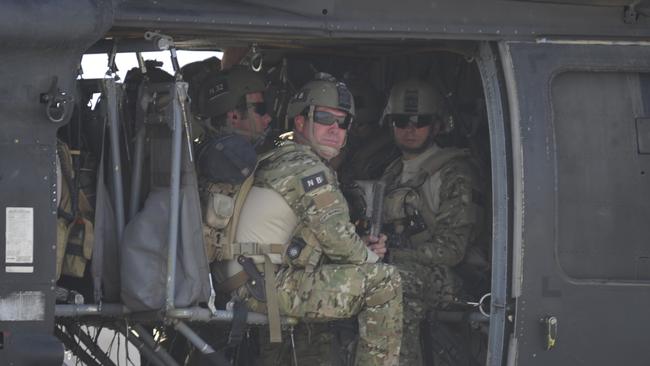
Memory is, for most of us, slippery. We remake and recreate, without even knowing we are doing it. We fill holes with tales told to us by others. Trauma exacerbates the process, and there is no trauma like that which those men suffered, and which today — Anzac Day — they have agreed to try to remember, lest anyone forget.
Excavating the memories isn’t pleasant, and nor is it simple. Take the case of former signalman Wilson, who was 17 when he dropped out of Bundaberg High School to join the army, having always had the desire. His first memory of the crash isn’t of the impact, the smoke or the fire, but of waking tied to a chair in a darkened room.

“I realised I’d been captured,” Wilson says, “and I had to get out, so I got up and took a step forward, but what I didn’t realise was my left foot was broken, and so I fell forward, into the push-up position, but then my left hand was also broken, so I collapsed onto my face, and mashed my nose, and my teeth, and I was trying to get up when I heard her.”
It was the melodic voice of an Australian nurse, helping him back to bed. Because none of it happened. Wilson was not captured in Afghanistan. He was scooped unconscious from a dry creek bed near the crash site by the medics from a second Black Hawk, which landed to help the wounded and recover the dead, and from there he was flown immediately to a hospital in Kandahar.
“That is the nature of my brain injury,” Wilson says. “I was recalling things that didn’t happen as I came out of my coma, things that still feel very real to me, even though I know they aren’t true. And that’s hard for people to understand, but it’s an example of what happens when you have a broken brain.”

If the capture of the Australian soldiers did not happen, what did?
An official army report says four Black Hawk helicopters headed out of Tarin Kowt in the early hours of June 21, 2010, for an assignment described to The Australian as “a quick hit” on a Taliban target. Rudland, who was one of 15 men aboard the American UH-60 that crashed, has a clear memory “from about noon on the day before the crash, discussing the seating plan”.
“I went back to my room to watch a movie — Zombieland — and I remember pressing pause to listen to a soldier who wanted to discuss the mission,” he says. “Then I pressed play … and I woke up in Germany.”
Rudland cannot, as a result of his head injury, remember approaching the Taliban target but knows from reading the official report of the incident that they were flying low and fast.
“Fly a Black Hawk at 10,000 feet, people can hear it from 25km out,” he says. “They scatter. Fly it at 50m, and they can’t hide. The idea is to hug the contours of the earth, until you are almost upon the target.
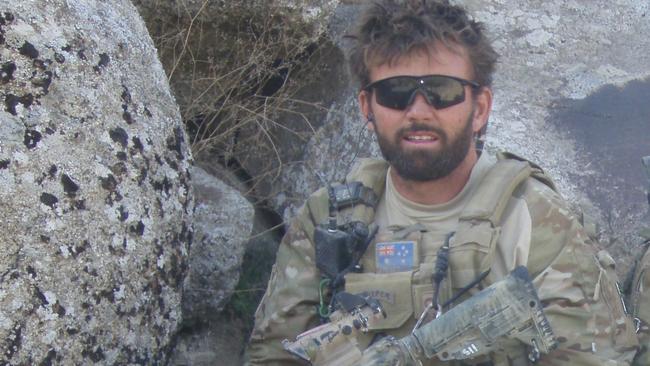
“So we were flying really low, and really, really fast, trying to surprise them.”
Rudland thinks he may well remember “looking out of the open aperture” on the chopper’s left side, seeing the ground coming towards him at lightning speed, and thinking “this isn’t good”. He may also remember “lying on the ground in a puff of dust”, but his first absolutely clear, post-crash recollection is of waking up in hospital with a busted pelvis, a broken back, a cracked kneecap and, most horrifically, a rifle-shaped wound along the length of one thigh, where his gun, red hot and forced down by impact, had become embedded in his flesh.
Robinson likewise has no memory of what happened once the chopper hit the ground. His wounds were shocking — among other things, he was “de-gloved” from the tailbone up, meaning stripped of skin from his buttocks to the small of his back — but he doesn’t remember sustaining any injuries. “My earliest memory is actually from two weeks before the crash,” he says.
He knows he was on his third deployment to Afghanistan, a country he remembers as “very beautiful, with mountains, valleys, flying up into the snow”, but also as having a strange, almost malefic energy.
“You never felt safe,” he says.
Robinson was a sniper team commander, leading heavily armed soldiers across battlegrounds. “But I hated being on the ground,” he says. “You got the feeling you couldn’t trust anyone. There were IEDs — they blow your legs off — and I feared them, and so the Black Hawks, for getting around, they seemed the safest.”
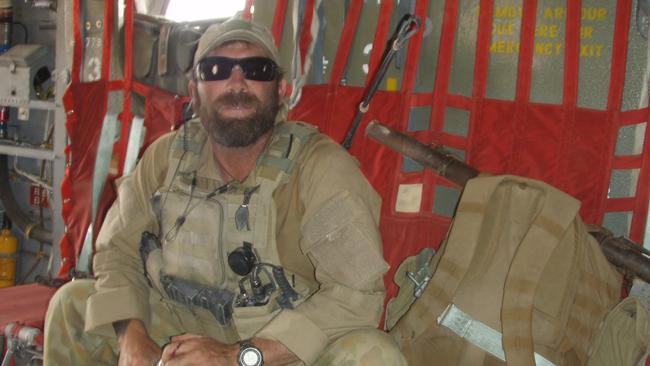
Robinson has no memory of climbing aboard the Black Hawk that came down, and therefore knows only what he and the others have been told: that it was caused not by enemy fire but by pilot error.
“But you have to be careful with how you say pilot error,” Rudland warns. “We were travelling extremely quickly, and we were three minutes out from the target. It was 3.39am, pitch black, everyone’s getting their gear ready, you can’t see bugger all, you’re one of four helicopters going that fast, really, really fast, at a low level, and unfortunately when things go wrong, they go catastrophically wrong.”
Officially, the Black Hawk hit the ground near a dry creek bed, and rolled, causing stunning damage. On-board stretchers, for example, were destroyed, to the point that medics from the second Black Hawk had to use aircraft cowling to get them off the ground, while the two other choppers provided cover.
“But if you ask me what actually happened, that’s all gone,” Robinson says. “That’s what we try to get across to people, how much is missing.”
His wife, Katrina, who is now his full-time carer, remembers everything. She sits in on the interview to help Robinson get the details of at least his recovery right.
“It was 4pm in Sydney and I’d come home from collecting the kids from school,” she says from the sofa opposite her husband.
They met when he was 17, she just 16 and both were working part-time jobs in a supermarket.
“An army padre was waiting for me,” she says.
The army flew Katrina to the hospital in Germany, where she found her husband “looking pretty peaceful, actually” in a coma. Besides the horror that was his rump and lower back, he was battling an infection, and part of one leg bone was missing. Doctors would for months try to save that leg, holding it in place with external fixtures, inserting internal poles, trying to grow new bone, stitching and bathing it, but all efforts failed. Twelve months on, with the leg still pussing, they had to cut it off.
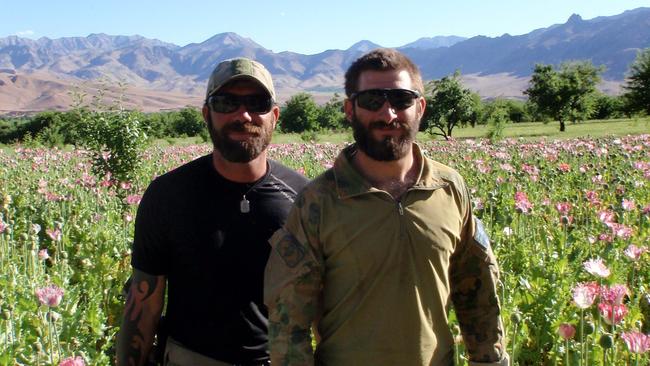
Robinson today has a prosthesis, on which he can walk, although not well, because the brain injury has robbed him of the co-ordination necessary to reliably put one foot in charge of the other.
Wilson’s brain injury affects mainly his mouth, in particular, his ability to swirl saliva, forcing him to work valiantly to form words that only with some effort by the listener can be clearly understood. “What I do remember is running past the phone on my way to board the chopper,” Wilson says. He was thinking of his then-fiance, Renee, wondering whether to call her, to say: “Hey, I love you, and I’m OK.”
“I was in full uniform, with all my gear, and I remember thinking: should I make a quick call?’” he says. “We were allowed to call home and say things like: “I’m going camping, fishing for four days, but don’t worry, I’ll call you after the weekend.”
But because this was supposed to be a “quick out and back” he didn’t call Renee. The next time she saw him he had broken bones in the left hand, his left foot, his left knee, his left hip, a broken nose, broken teeth and burns “on the part of my body that didn’t have tattoos, which goes to show they protect you”.
“When I made contact with Renee, I said I still want to marry you. I still want to have a family with you. Why should that stop?” he says.
She was thrilled and eight years later they have two children, but much else about his former life has been lost and will never return.
“Before the accident, I could jump up and say, I’ll do this.
“But now I have to get up, fall over, because my foot isn’t working properly, and that’s the brain injury. I used to ride a motorcycle. I can’t ride any more. I can’t drive a manual car.”
Harder to describe than even the effects of the brain injuries are those to the psychology of men injured in war.
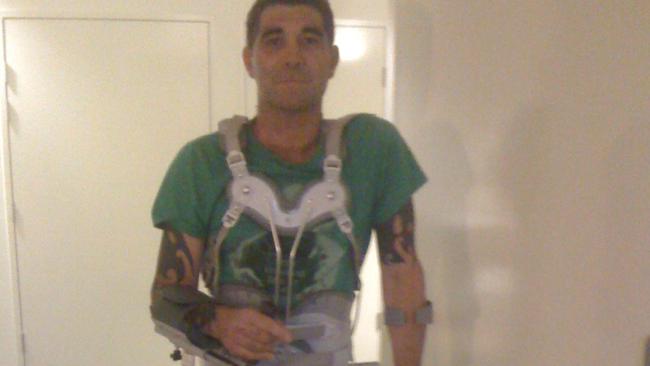
Soldiers tend towards physical challenges. Ask them why they enlisted, most will also say teamwork, mateship, camaraderie, all of which falls away, with sometimes catastrophic, even suicidal consequences, after a separation from the military. That explains, in part, why the army has allowed these men to come forward to tell their stories.
All three are using the oldest mental health medicine — sport — to tackle loss of purpose. To that end, all will compete in the Invictus Games for injured servicemen and women, in Sydney in October. The event is championed to great effect, and with great enthusiasm, by the ebullient Prince Harry, who will attend the event with his by-then wife Meghan. Her presence alone will ensure that the games receive the razzle-dazzle coverage they deserve, but there’s also no question that the support of the prince has lifted Invictus from an event for the military into one all can get behind.
But it’s not all glamour. For these three Australian athletes, the seriousness of the training has made the difference between living a doleful life, and finding a very good reason to go on.
Katrina Robinson says her husband, after he lost the leg, would stay in his wheelchair with a rug over his lap. He didn’t want people to see him. He wouldn’t want to socialise. He understood that his army career was over, and what would replace it? Sport has played a crucial role in his recovery. “You can’t sit home and stew. You have to get to training because there’s a coach waiting for you,” he says.
Katrina says Invictus saved them as a couple, and Garry as a man of physical strength and dignity. “Before he started training for his first games, he’d get so frustrated just trying to walk, he’d punch the wall,” she says. “He has an outlet now. And he’s part of something again.”
So grateful was she to the prince for putting Invictus on the map, she penned Harry a handwritten letter, and when he came to Sydney last year to promote this year’s games she had it in her handbag, wondering if she would find the courage to give it to him.
“Then we got introduced, and I said: ‘I’ve got a letter. I don’t know whether to give it to you’, and he said: ‘Give it to me now’.”
She handed it over, thinking he might hand it to an aide, but Harry took the letter, opened it, stood there and read it. Then he smiled, and put it in his pocket, like Katrina’s family’s sacrifice was something he would always want to remember, one we must not forget.




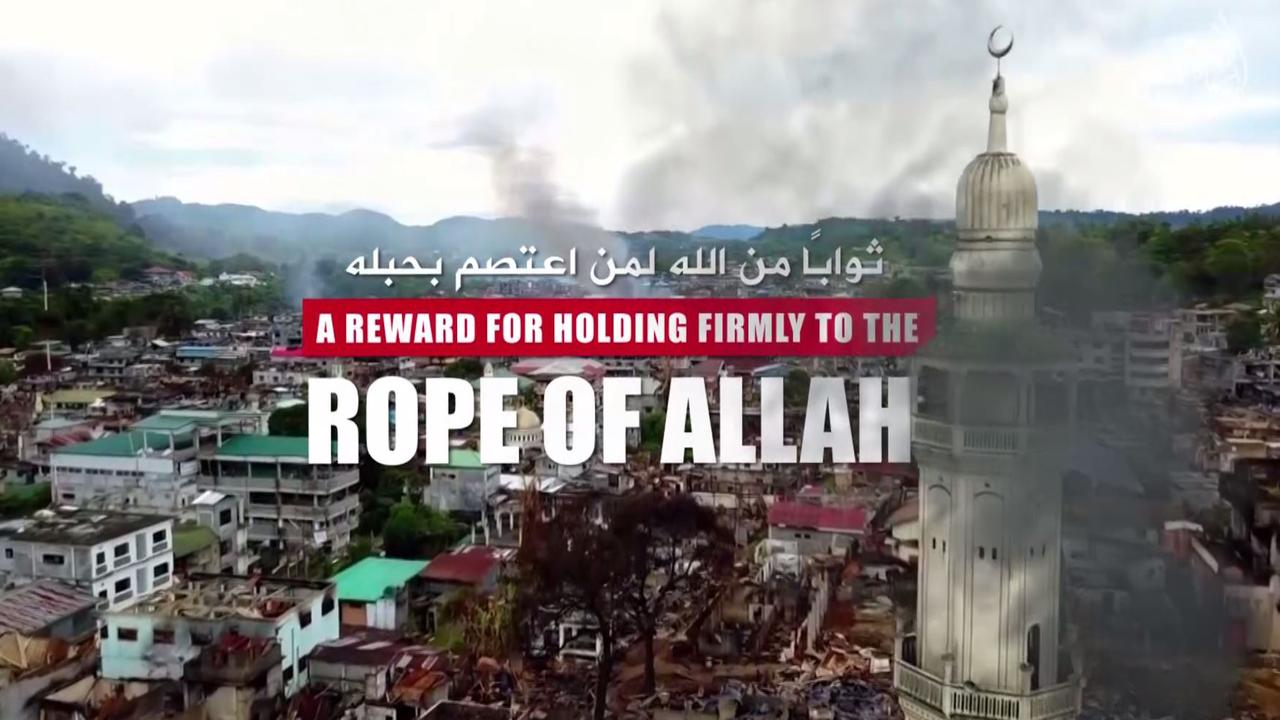
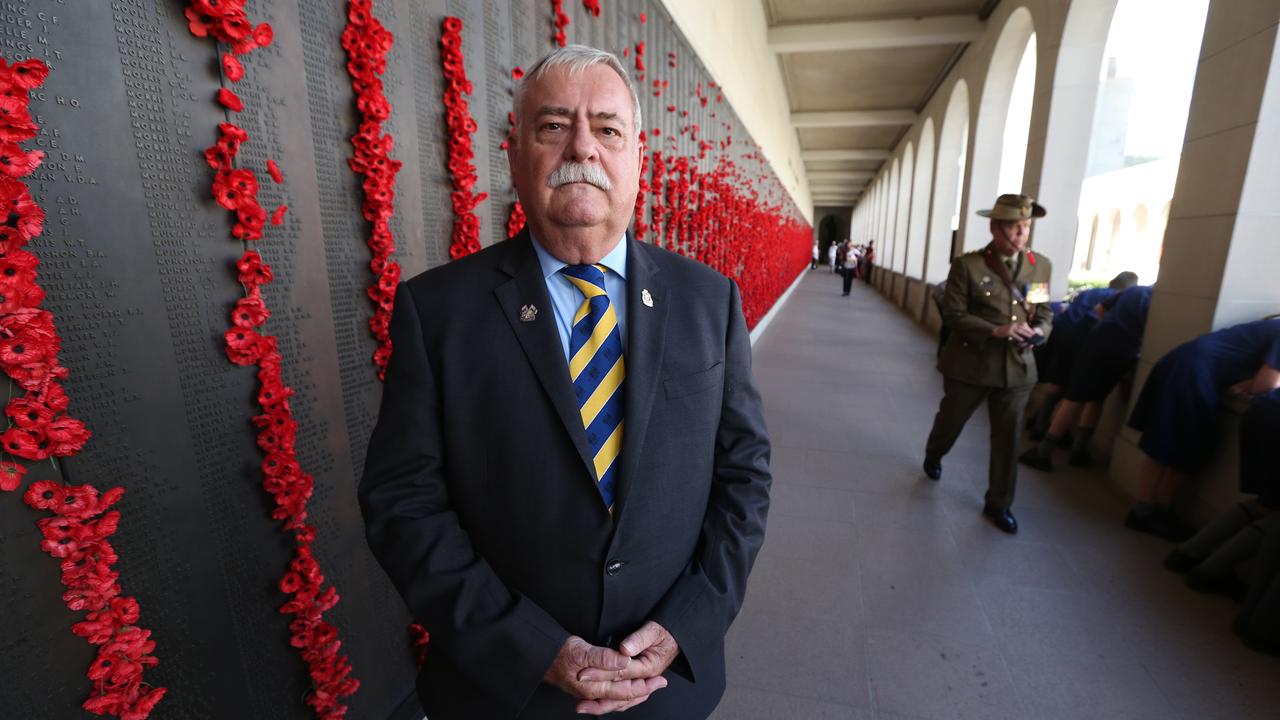
To join the conversation, please log in. Don't have an account? Register
Join the conversation, you are commenting as Logout